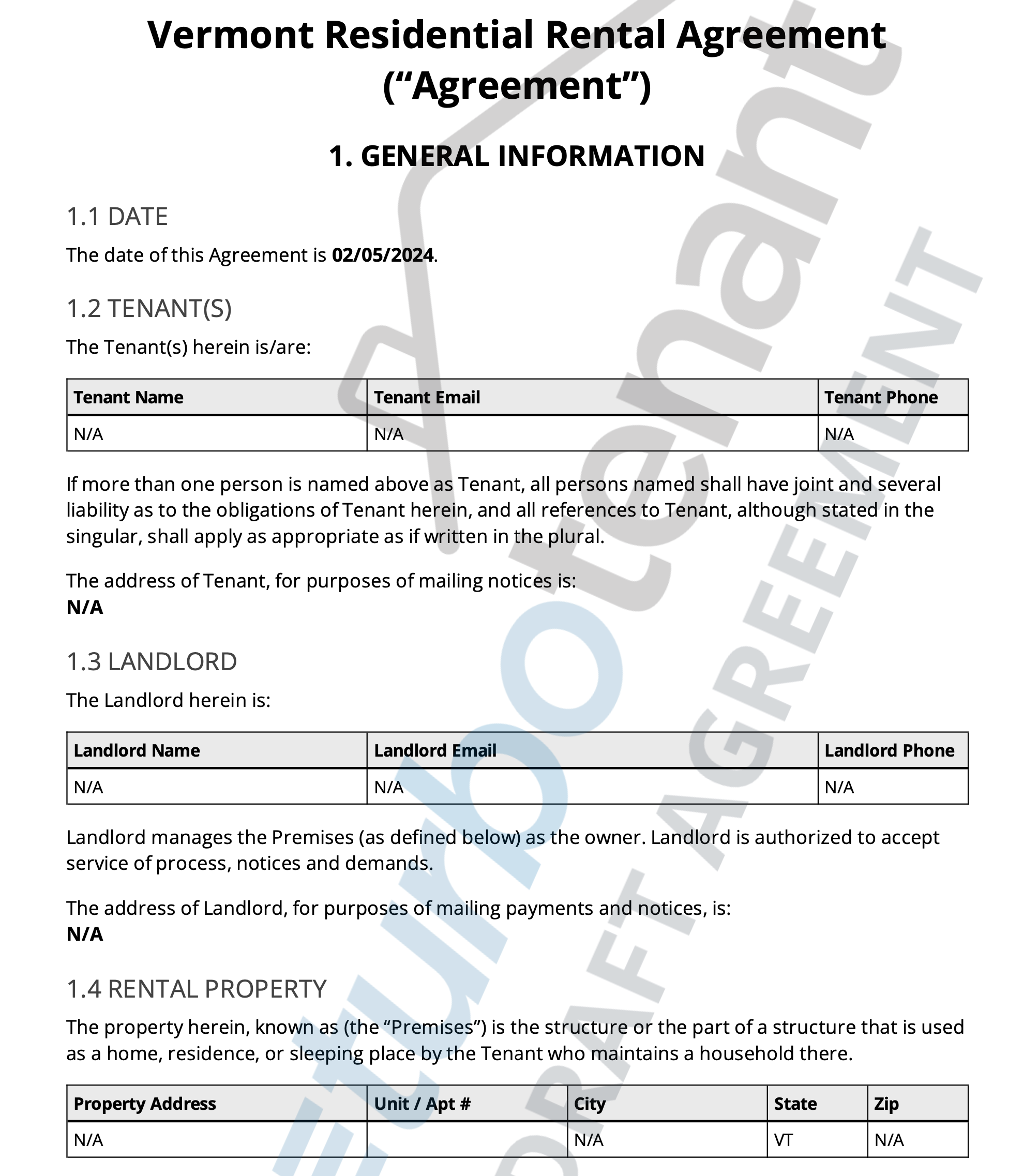
When drafting lease agreements in Vermont, including the specific locales of Burlington and Barre, landlords must comply with both state and local regulations. TurboTenant’s Lease Agreement Generator and Templates are designed to ensure legal compliance while allowing landlords to customize details pertinent to their rental property. This article will guide through the essential elements of Vermont lease agreements, with a special focus on the unique requirements for Burlington and Barre.
Section 1 – Custom to You
The first section of a Vermont lease agreement is customizable to your rental property. It allows you to input details about the tenants, lease duration, rent amount, utility responsibilities, and other vital terms of the lease.
Key Customizable Elements
- Additional Provisions: Enables landlords to add property-specific rules or local clauses.
- Lost Key Policy: Tenants are required to pay for rekeying if they fail to return all keys upon moving out.
Section 2 – Legal Provisions
This section ensures adherence to the laws of Vermont, with additional clauses for Burlington and Barre to maintain local compliance.
Vermont State Regulations
- Late Fees: Vermont does not allow charging of late fees, but landlords may recover a reasonable percentage of actual expenses incurred if rent is late.
- Security Deposit Provisions: There’s no statutory limit for security deposits in Vermont, typically one to two times the monthly rent. Deposits must be returned within 14 days post-lease termination with an itemized statement of deductions. Entry/Access by Landlord: Landlords must attempt to provide at least a 48-hour notice before entering the premises, barring emergencies or if the tenant requests repairs.
Burlington/Barre Specific Regulations
- Security Deposit Limit: Deposits may not exceed one month’s rent, with pet deposits capped at half a month’s rent.
- Interest on Deposits: Security deposits must be held in an interest-bearing account, with the interest accruing for the tenant’s benefit.
- Return of Deposit: Must include an itemized deduction statement and information on the tenant’s right to a hearing before the local housing board.
Section 3 – General Clauses for Best Practices
This section includes clauses common across the United States, focusing on fostering a healthy landlord-tenant relationship.
Key General Clauses
- Subletting: Tenants are prohibited from subleasing without the landlord’s written consent.
- Altering the Property: Written permission from the landlord is required for any property alterations or improvements.
- Military Personnel and Victim Protection: Recognizes federal and state laws allowing lease termination under specific circumstances for military personnel and victims of certain crimes.

FAQ
Are late fees allowed in Vermont?
Late fees are not permitted in Vermont lease agreements. Instead, landlords may charge a reasonable percentage of actual expenses incurred if rent is late.
What is the standard security deposit in Vermont?
While there is no statutory limit, the typical security deposit in Vermont is one to two times the monthly rent. Vermont law requires the return of the deposit within 14 days after lease termination, with a written statement itemizing any deductions.
Can landlords enter the rental property without notice?
Landlords in Vermont have the right to enter the rental property for various reasons. However, they should make a good faith effort to provide at least a 48-hour notice in non-emergency situations.
Are landlords in Burlington/Barre allowed to charge late fees?
No, landlords in Burlington/Barre, Vermont, are not allowed to charge late fees. They can only recover a reasonable percentage of actual expenses incurred due to late rent payments.
How are security deposits handled in Burlington/Barre?
Security deposits in Burlington/Barre cannot exceed one month’s rent, and any pet deposit may not be more than half a month’s rent. The deposits must be held in an interest-bearing account, and the interest earned is for the tenant’s benefit.
What is the procedure for returning security deposits in Burlington/Barre?
Landlords must return the security deposit within 14 days of lease termination, along with an itemized statement of deductions. Tenants have the right to a hearing before the local housing board regarding any deductions from their deposits.
Can a landlord enter the rental property without notice in Burlington/Barre?
Landlords must make a good faith effort to notify tenants at least 48 hours prior to entry for non-emergency situations. Immediate entry without notice is permitted in emergencies or if the tenant requests repairs.
What are the rules regarding late fees in Vermont and Burlington/Barre?
- In Vermont, late fees are not permitted. Landlords can only charge a reasonable percentage of actual expenses incurred due to late rent.
- The same applies to Burlington/Barre, with no specific local ordinances altering this state rule.
How do security deposit provisions differ in Vermont and Burlington/Barre?
- Throughout Vermont, there is no statutory limit on security deposits, but they are commonly one to two times the monthly rent.
- In Burlington/Barre, security deposits cannot exceed one month’s rent, and pet deposits are limited to half a month’s rent. Interest must be paid or credited to the tenant upon lease termination.
Can landlords enter rental property without notice?
In both Vermont and Burlington/Barre, landlords must make a good faith effort to provide at least a 48-hour notice before entering the premises, except in emergency situations or if the tenant requests a repair.
TurboTenant Vermont Lease Agreements
TurboTenant’s tools provide Vermont landlords, including those in Burlington and Barre, with the resources to create lease agreements that are comprehensive, tailored, and legally compliant. Landlords are advised to consult with a lawyer for any additional provisions to ensure they do not conflict with state or local laws and are consistent with the lease agreement as a whole.
Vermont Resources

